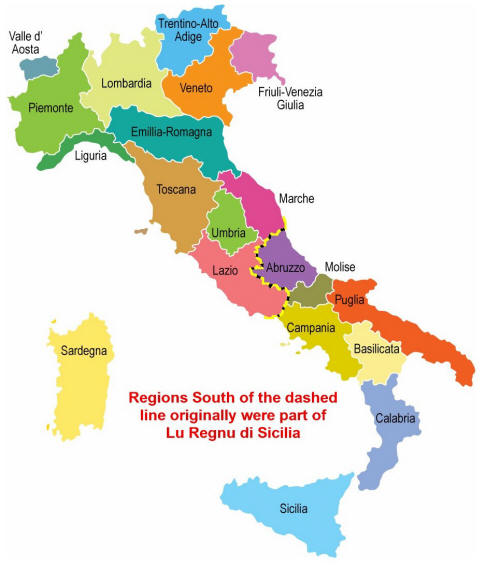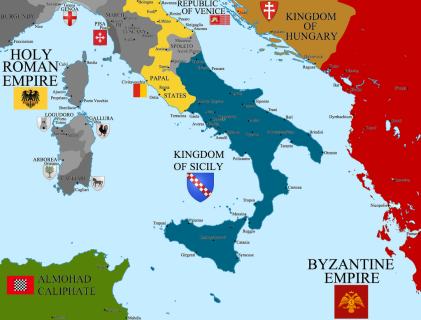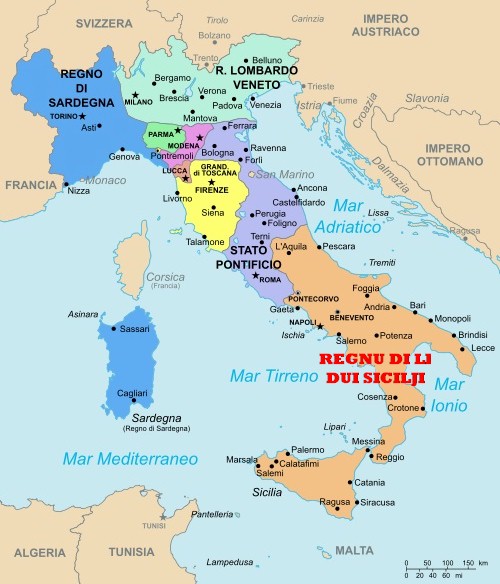|
In spite of the poverty and forced illiteracy of the
common people, the treasury coffers of the Kingdom of the Two
Sicilies far exceeded the holdings of all the northern duchies and
city-states combined. For this and other geopolitical reasons there
was a groundswell for ‘uniting’ the overall region and establishing
a new nation. Then came Garibaldi.
Giuseppe Garibaldi was the quintessential ‘soldier of fortune’. He
was born in Nizza (now Nice) which had been recently annexed by
France, but whose citizens had loyalty to the Italian-speaking
city-state of Genoa, part of the Kingdom of
Sardegna
(Sardinia). Garibaldi, who had fought in revolutions in Brazil and
Uruguay, dreamed of his birthplace Nice being a part of a united
‘Italy’. In 1860, he led his army in attacking the island portion
of the Two Sicilies, gaining some support from the property-poor
peasants by promising land reforms and the establishment of a
republic to replace the monarchy of the Bourbons. In
his conquest of Sicily, it must be remembered that the casualties he
caused were Sicilians. Some were loyalists, supporting what they
saw as their rightful ruler.
An example of the terror the Sicilian populace suffered is the
occurrence at Bronte. Bronte was and is a small village in Catania
Province. After some unrest in the village, Garibaldi sent one of
his trusted generals and fellow Genovese Nino Bixio to Bronte to
establish the peace.
Bixio ordered a
kangaroo court and had five Bronteans summarily shot, earning him
the sobriquet ‘the
Butcher of Bronte’. During the Sicilian campaign, he wrote to
his wife: "In these regions (i. e. Sicily) it is not enough to
kill the enemy, it is necessary to torment them, to burn them alive
in a slow flame... they are regions that need to be destroyed or at
least depopulated, their people sent to Africa to become civilized."
Bixio went on with Garibaldi to conquer the Sicilian portion of
the mainland. Garibaldi presented the Two Sicilies to Vittorio
Emmanuele, King of Sardinia, who incorporated them, along with the
northern city-states, into the
Kingdom of
Sardinia.
And that was the name of the ‘unified’ country, until in 1861 the
name was changed to the 'Kingdom of Italy’ and Emmanuele was
declared its king. So the 'Kingdom of Italy' came into being
seven hundred and thirty-one years after the Kingdom
of Sicily was formed.
The upshot was that Garibaldi’s birthplace, Nice, was not included
in Italy, but permanently ceded to France; and instead of the
democratic republic he had promised to the peasants of Sicily, they
simply went from the yoke of the Bourbons to that of another supreme
monarch, Vittorio Emmanuele. ‘Land reforms’, rather than enabling
common folk to become property owners, instead stripped land from
former nobility and the Catholic church and transferred it to
opportunists and venture capitalists. Not trusting locals to manage
their own affairs, administrators and government officials were sent
from the north, along with carabinieri (national police) to
keep the peace. These northern expatriates did not speak or
understand Sicilian and many shared Bixio’s contempt for the region,
feeding the Sicilians' innate distrust of strangers and corrupt
officialdom.
Another unpopular result of unification was the imposition of
something never before seen in Sicily: the military draft. All
able-bodied male citizens of the unified country were required to
report for military duty on turning twenty years of age. The wars
that they fought and died in were mostly in the Alps, along the
northern border of the new ‘Italy’. Sicilians saw the flower of
their youth taken from the fields, where they were needed in family
enterprises, “to fight in northern wars”.
These conditions all contributed to the ‘Great Migration’, in which
millions emigrated from the lands of the former Kingdom of Sicily in
search of a better life in Belgium, France, Australia, and in the U.
S. and Canada. Many settled here in Western New York, and helped
build our community, in a wave of immigrants that can be considered
a back-handed tribute to Garibaldi. Giuseppe Garibaldi, a hero to
Italians. To Sicilians, not so much.
It's this
history that leads me to give a curt response whenever a new
acquaintance asks: "Coniglio, eh? Are you Italian?"
Invariably,
my answer remains the same: "No,
I'm Sicilian."
Check this map: you may be, too!
|
 |
|
A condensed version of this article first appeared in
the Spring 2017 issue of
Per Niente Magazine. |
 |
|






